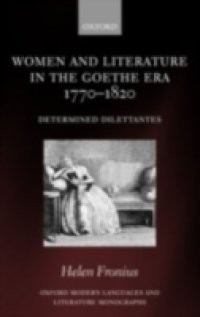The Goethe era of German literature was dominated by men. Women were discouraged from reading and scorned as writers; Schiller saw female writers as typical 'dilettantes'. But the attempt to exclude did not always succeed, and the growing literary market rewarded some women's determination. This study combines archival research, literary analysis, and statistical evidence to give a sociological-historical overview of the conditions of women's literary production. Highlighting many authors who have fallen into obscurity, this study tells the story of women who managed to write and publish at a time when their efforts were not welcomed. Although eighteenth-century gender ideology is an important pre-condition for women's literary production, it does notnecessarily determine the praxis of their actual experiences, as this study makes clear. Using a range of examples from a variety of sources, the real story of women who read, wrote, and published in the shadow of Goethe emerges.

